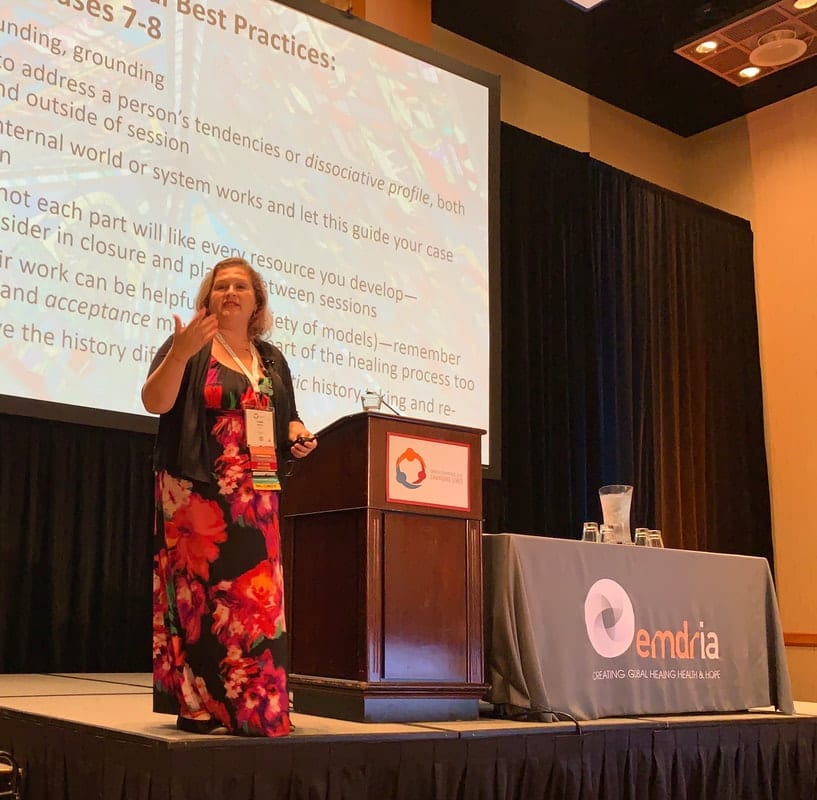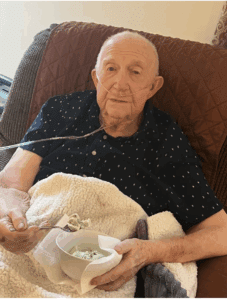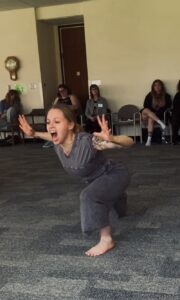Over the years I’ve been met with, “Oh, you do qualitative research,” in a tone that suggests: That’s cute, but what does it really prove? The findings from qualitative research won’t really help to advance the scientific aspects of trauma therapy. The field and the people making the decisions about what constitutes evidence-based practice want the numbers, the empirical data. Especially when we promote approaches like EMDR therapy. We have to prove it works with science to the naysayers!
Having been raised by a math teacher mother and cheered on by her math teacher father, I was encouraged to study science and math with top priority when I was in school.
“That’s where all the jobs of the future are,” my mother reasoned.
I advanced to organic chemistry and calculus II in my undergraduate studies, forcing myself to get A’s. And yet I truly failed to see how any of it mattered in making me a better person. To be clear, I’m not one of those anti-science types. I recognize the massive importance of empirical inquiry and believe that quantitative thinkers are necessary in an enlightened world. Yet they do not hold all the pieces of the puzzle as the black-and-white ethic that keeps us stuck in the fearfulness of modern times would have us believe. Sometimes what they measure in numbers doesn’t reflect the reality of others’ lived experiences. Intoning the wisdom of a professor in my doctorate program, quantitative inquiry may be like the skeleton of a system, but qualitative offers the muscles, the blood supply, and the vital organs. We need the entire system in order to move forward.
I’ve always seen the world in themes, colors, emotions, and stories. Savoring and reinventing communication is my favorite art form. When I was in school trying to make people believe I was good at math and science, I excelled the most in social studies, English, and the performing arts. They seemed to make my miserable life brighter and worth living. Oddly, I managed to qualify for the International Science and Engineering Fair my junior year of high school. Even my teammates wondered how the content of my project was strong enough to make it through the Ohio selection process. Quite frankly, it was on the power of my presentation skills and connecting the dots of relevance of the science to modern consumers. Indeed, in the field of counseling studies, empirical inquiry is often described as being able to prove that something works, whereas qualitative inquiry shows us how something works. Even as a kid, that was my strong suit!
When I “came out” to my mother during college to tell her I was not going to go the pre-med track, but rather, had decided to study History and English/Pop Culture, I thought she was going to have a heart attack.
“But math… science… that’s where the future is at.”
I told her I was willing to take the risk.
The flow of life brought me to a career in clinical counseling and I became a doctor, although not the type she wanted me to be. I quickly became the kind of counselor who knew I could not be guided by research alone. Client preference, context, culture, and clinical judgment emerging from my own lived experiences (all components of evidence-based practice according to the American Psychological Association) also guided me. Working to heal and to understand myself translated into my enhanced clinical efficacy, as shown by more favorable client outcomes. I took to qualitative phenomenological research like a duck to water. Especially as someone with a mind that has always felt like a mosaic, in it I found beautiful lenses through which to study the world and the people in it.
During the 2008 EMDR International Association (EMDRIA) conference, I won first prize in the research poster competition for my dissertation pilot study on the use of EMDR therapy in addiction continuing care. I was the only qualitative study in the competition, and both research committee chairs, almost through gritted teeth, told me that I was the first qualitative project to ever win the award.
“What can I say, the methodology was solid,” one of them said.
That is an important point to emphasize. Qualitative research is not about pulling concepts out of mid-air or fishing for the lived experience of others just to prove your point. There is a systematized way to analyze themes in order to draw conclusions. For instance, Amadeo Giorgi’s Descriptive Phenomenological Psychological Method is a simple yet effective process for reading data—people’s descriptions of their lived experience with the phenomenon being investigated—to extrapolate the common threads. Elisabeth Kübler-Ross used a similar style of research in her work. Brené Brown, who is single-handedly changing the world with her teachings of overcoming shame through vulnerability and courage, is a qualitative researcher known for using such methods. The rich lessons of humanity reveal themselves in themes and stories in a way numbers may never do them justice.
So, that dissertation research went on to get me two publications in major journals of the American Psychological Association, Psychology of Addictive Behaviors and The Journal of Humanistic Psychology. Yet these studies from 2010 and 2012 are rarely, if ever, cited in literature reviews on EMDR therapy. Indeed, one of my major criticisms with Dr. Shapiro’s final edition of EMDR Therapy: Principles, Protocols, and Procedures (2018) was that aside from mentioning a few case studies in passing, not a single, substantial qualitative study was cited. And a lovely collection of qualitative literature exists on EMDR therapy that goes beyond case studies, yet the community at large rarely seems to look at them. In our desperation to prove that EMDR works, we may be missing vital information on why it works and how it brings about transformation in the lives of the people we serve. I venture to guess this experience is not unique to the field of EMDR therapy.
Indeed, in another area of psychology that interests me greatly, the study of dissociation, I observe similar problems. My lived experience with dissociation is truly lived experience. As followers of my work know, I’ve talked and written openly about my own struggles with dissociation. I gently tested the waters as early as 2011 and in 2018, I came out very fully and unapologetically. I challenged people interested in dissociation to look beyond the heavy textbooks and the numeric inventories like the Dissociative Experiences Scale (DES) and the clunky Multidimensional Inventory of Dissociation (MID) and into their own lived experiences as a treasure trove of inquiry. Being dissociative is a fundamentally protective mechanism of humanity that we’ve all experienced in one form or another. There is nothing fundamentally wrong with using quantitative measures and other people’s scholarly writing to help yourself and the people you work with better understand dissociation, especially if it helps the client. Yet if you are only using the quantitative and other people’s citations to advance your study, you are missing big parts of the picture.
At the 2019 EMDRIA Annual Conference, my identity as a qualitative thinker connected to the beautiful circle that began eleven years earlier as an eager doctoral student. I won EMDRIA’s Advocacy Award for my willingness to be out about my own struggles and use platforms like YouTube and blogging to translate the how and why of EMDR therapy to the masses. Two other happenings at the conference, however, helped me further connect to why I love being a qualitative phenomenologist so much. First, Dr. Derek Farrell, an English EMDR scholar and only EMDR trainer in the world to offer a master’s degree specific to EMDR therapy, endorsed the importance of qualitative research during his Sunday keynote address. He expressed that quantitative research is very top-down in its orientation, whereas qualitative research is bottom-up.
I squealed with the same enthusiasm that woke my partner up back when I first read Edmund Husserl. Finally, a member of the EMDR establishment was making such a bold pitch for the necessity of what thinkers like me can do. In trauma therapy, we generally teach that top-down interventions are very cerebral, whereas bottom-up interventions primarily address the body, emotions, and visceral experiences. In sum, we need both top-down and bottom-up, yet what EMDR therapists have long identified as missing from traditional talk therapy is the bottom-up. This bottom-up has also been missing from psychotherapy research or dismissed as not that important. That attitude must change if we are going to maintain the soul of our work while also pushing for empirical data. People are holistic beings, so why can’t science be total and integrative as well? Qualitative is artful yet it is not just art. Rather, it is art with the power to illuminate the science and make it more relevant and applicable to the people it serves.
Later that day I went on to give a ninety-minute talk on my own lived experience as a woman in recovery from a dissociative disorder and how that’s informed my work as a clinician. Every other time I heard a presentation on dissociation at the EMDRIA conference, while not doubting its content and relevance, I felt offended that people like me were being talked about in such cold and technical terms. Something vital has been missing that couldn’t be measured by any score on the DES or the MID, both of which can be very difficult and even impractical for people with dissociative minds to take. Not only that, they attempt to measure in numbers a phenomenon that is experienced in qualitative layers. During the Q & A period, I fielded a criticism that my presentation did not rely enough on the citations of others and that perhaps I misunderstood the intent of someone whom I did cite. I answered that by framing this presentation as a true sharing of phenomenology, I wanted to shift the paradigm, or at least open up another portal of inquiry. Some people are not ready for that, which I expected. And yet for the people who are, you are in for a treat.
A few questions later another individual came up to the microphone and asked about a case he was working on where an emerging seven-year-old perplexed him. I asked him a few questions back about his own lived experience as a seven-year-old and as the parent of a seven-year-old. I wish that other members of the audience could have seen on the big screen just how much his face lit up when he realized the answer was within him all along. And when he realized that, he knew exactly how to proceed with his case.
In response, I said, “No citation will teach you that.”
While citations and research, even qualitative research, is important, what life as a phenomenologist has taught me is that your own lived experience has more to teach you than you’ve ever imagined. Learning about the lived experiences of others, with an open mind and heart, and letting them communicate with your own will change the world. That is the future of which I want to play a colorful, thematic, multifaceted, holistic part.
So Mom, I love you, and I respectfully disagree with your career guidance. My present—and my future—is qualitative.
References:
American Psychological Association Presidential Task Force on Evidence-Based Practice, “Evidence-Based Practice in Psychology,” American Psychologist, 61, no. 4 (2005), 271-285.














